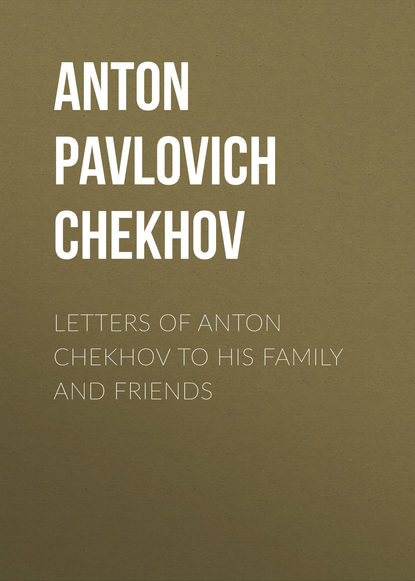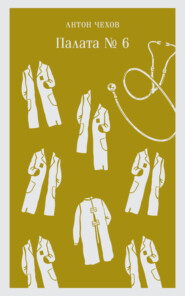По всем вопросам обращайтесь на: info@litportal.ru
(©) 2003-2024.
✖
Letters of Anton Chekhov to His Family and Friends
Настройки чтения
Размер шрифта
Высота строк
Поля
I wish you every sort of blessing. I congratulate you on the peace between Japan and China, and hope we may quickly obtain a Feodosia free from ice on the East Coast, and may make a railway to it.
The peasant woman had not troubles enough so she bought a pig. And I fancy we are saving up a lot of trouble for ourselves with this ice-free port. [Footnote: Prophetic of Port Arthur and the Japanese War.] It will cost us dearer than if we were to take it into our heads to wage war on all Japan. However, futura sunt in manibus deorum.
MELIHOVO,
October 21, 1895.
Thanks for your letter, for your warm words and your invitation. I will come, but most likely not before the end of November, as I have a devilish lot to do. First in the spring I am going to build a new school in the village where I am school warden; before beginning I have to make a plan and calculations, and to drive off here and there, and so on. Secondly – can you imagine it – I am writing a play which I shall probably not finish before the end of November. I am writing it not without pleasure, though I swear fearfully at the conventions of the stage. It’s a comedy, there are three women’s parts, six men’s, four acts, landscapes (view over a lake); a great deal of conversation about literature, little action, tons of love. [Footnote: “The Seagull.”] I read of Ozerova’s failure and was sorry, for nothing is more painful than failing… I have read of the success of the “Powers of Darkness” in your theatre… When I was at Tolstoy’s in August, he told me, as he was wiping his hands after washing, that he wouldn’t alter his play. And now, remembering that, I fancy that he knew even then that his play would be passed by the censor in toto. I spent two days and a night with him. He made a delightful impression, I felt as much at ease as though I were at home, and our talks were easy…
MOSCOW,
October 26, 1895.
Tolstoy’s daughters are very nice. They adore their father and have a fanatical faith in him and that means that Tolstoy really is a great moral force, for if he were insincere and not irreproachable his daughters would be the first to take up a sceptical attitude to him, for daughters are like sparrows: you don’t catch them with empty chaff… A man can deceive his fiancee or his mistress as much as he likes, and, in the eyes of a woman he loves, an ass may pass for a philosopher; but a daughter is a different matter…
MELIHOVO,
November 21, 1895.
Well, I have finished with the play. I began it forte and ended it pianissimo– contrary to all the rules of dramatic art. It has turned into a novel. I am rather dissatisfied than satisfied with it, and reading over my new-born play, I am more convinced than ever that I am not a dramatist. The acts are very short. There are four of them. Though it is so far only the skeleton of a play, a plan which will be altered a million times before the coming season, I have ordered two copies to be typed and will send you one, only don’t let anyone read it…
TO HIS BROTHER MIHAIL
PETERSBURG, October 15, 1896.
… My “Seagull” comes on on the seventeenth of October. Madame Kommissarzhevsky acts amazingly. There is no news. I am alive and well. I shall be at Melihovo about the twenty-fifth or towards the end of October. On the twenty-ninth is the meeting of the Zemstvo, at which I must be present as there will be a discussion about roads…
TO A. S. SUVORIN
PETERSBURG, October 18, 1896.
I am off to Melihovo. All good wishes… Stop the printing of the plays. I shall never forget yesterday evening, but still I slept well, and am setting off in a very tolerable good humour.
Write to me… I have received your letter. I am not going to produce the play in Moscow. I shall never either write plays or have them acted.
TO HIS SISTER
PETERSBURG, October 18, 1896.
I am setting off to Melihovo. I shall be there tomorrow between one or two o’clock in the afternoon. Yesterday’s adventure did not astonish or greatly disappoint me, for I was prepared for it by the rehearsals – and I don’t feel particularly bad.
When you come to Melihovo bring Lika with you.
TO HIS BROTHER MIHAIL
PETERSBURG, October 18, 1896.
The play has fallen flat, and come down with a crash. There was an oppressive strained feeling of disgrace and bewilderment in the theatre. The actors played abominably stupidly. The moral of it is, one ought not to write plays.
TO A. S. SUVORIN
MELIHOVO, October 22, 1896.
In your last letter (of October 18) you three times call me womanish, and say that I was in a funk. Why this libel? After the performance I had supper at Romanov’s. On my word of honour. Then I went to bed, slept soundly, and next day went home without uttering a sound of complaint. If I had been in a funk I should have run from editor to editor and actor to actor, should have nervously entreated them to be considerate, should nervously have inserted useless corrections and should have spent two or three weeks in Petersburg fussing over my “Seagull,” in excitement, in a cold perspiration, in lamentation… When you were with me the night after the performance you told me yourself that it would be the best thing for me to go away; and next morning I got a letter from you to say good-bye. How did I show funk? I acted as coldly and reasonably as a man who has made an offer, received a refusal, and has nothing left but to go. Yes, my vanity was stung, but you know it was not a bolt from the blue; I was expecting a failure, and was prepared for it, as I warned you with perfect sincerity beforehand.
When I got home I took a dose of castor oil, and had a cold bath, and now I am ready to write another play. I no longer feel exhausted and irritable, and am not afraid that Davydov and Jean will come to me and talk about the play. I agree with your corrections, and a thousand thanks for them. Only please don’t regret that you were not at the rehearsals. You know there was in reality only one rehearsal, at which one could make out nothing. One could not see the play at all through the loathsome acting.
I have got a telegram from Potapenko – “A colossal success.” I have had a letter from Mlle. Veselitsky (Mikulitch) whom I don’t know. She expresses her sympathy in a tone as if one of my family were dead. It’s really quite inappropriate; that’s all nonsense, though.
My sister is delighted with you and Anna Ivanovna, and I am inexpressibly glad of it, for I love your family like my own. She hastened home from Petersburg, possibly imagining that I would hang myself…
TO E. M. S
MELIHOVO, November, 1896.
If, O honoured “One of the Audience”, you are writing of the first performance, then allow – oh, allow me to doubt your sincerity. You hasten to pour healing balsam on the author’s wounds, supposing that, under the circumstances, that is more necessary and better than sincerity; you are kind, very kind, and it does credit to your heart. At the first performance I did not see all, but what I did see was dingy, grey, dismal and wooden. I did not distribute the parts and was not given new scenery. There were only two rehearsals, the actors did not know their parts – and the result was a general panic and utter depression; even Madame Kommissarzhevsky’s acting was not up to much, though at one of the rehearsals she acted marvellously, so that people sitting in the stalls wept with bowed heads.
In any case I am grateful and very, very much touched. All my plays are being printed, and as soon as they are ready I shall send you a copy…
TO A. F. KONI
MELIHOVO, November 11, 1896.
You cannot imagine how your letter rejoiced me. I saw from the front only the two first acts of my play. Afterwards I sat behind the scenes and felt the whole time that “The Seagull” was a failure. After the performance that night and next day, I was assured that I had hatched out nothing but idiots, that my play was clumsy from the stage point of view, that it was not clever, that it was unintelligible, even senseless, and so on and so on. You can imagine my position – it was a collapse such as I had never dreamed of! I felt ashamed and vexed, and I went away from Petersburg full of doubts of all sorts. I thought that if I had written and put on the stage a play so obviously brimming over with monstrous defects, I had lost all instinct and that, therefore, my machinery must have gone wrong for good. After I had reached home, they wrote to me from Petersburg that the second and third performances were a success; several letters, some signed, some anonymous, came praising the play and abusing the critics. I read them with pleasure, but still I felt vexed and ashamed, and the idea forced itself upon me that if kind-hearted people thought it was necessary to comfort me, it meant that I was in a bad way. But your letter has acted upon me in a most definite way. I have known you a long time, I have a deep respect for you, and I believe in you more than in all the critics taken together – you felt that when you wrote your letter, and that is why it is so excellent and convincing. My mind is at rest now, and I can think of the play and the performance without loathing. Kommissarzhevskaia is a wonderful actress. At one of the rehearsals many people were moved to tears as they looked at her, and said that she was the first actress in Russia to-day; but at the first performance she was affected by the general attitude of hostility to my “Seagull,” and was, as it were, intimidated by it and lost her voice. Our press takes a cold tone to her that doesn’t do justice to her merits, and I am sorry for her. Allow me to thank you with all my heart for your letter. Believe me, I value the feelings that prompted you to write it far more than I can express in words, and the sympathy you call “unnecessary” at the end of your letter I shall never never forget, whatever happens.
TO V. I. NEMIROVITCH-DANTCHENKO
MELIHOVO, November 26, 1896.
DEAR FRIEND,
I am answering the chief substance of your letter – the question why we so rarely talk of serious subjects. When people are silent, it is because they have nothing to talk about or because they are ill at ease. What is there to talk about? We have no politics, we have neither public life nor club life, nor even a life of the streets; our civic existence is poor, monotonous, burdensome, and uninteresting – and to talk is as boring as corresponding with L. You say that we are literary men, and that of itself makes our life a rich one. Is that so? We are stuck in our profession up to our ears, it has gradually isolated us from the external world, and the upshot of it is that we have little free time, little money, few books, we read little and reluctantly, we hear little, we rarely go anywhere. Should we talk about literature? … But we have talked about it already. Every year it’s the same thing again and again, and all we usually say about literature may be reduced to discussing who write better, and who write worse. Conversations upon wider and more general topics never catch on, because when you have tundras and Esquimaux all round you, general ideas, being so inappropriate to the reality, quickly lose shape and slip away like thoughts of eternal bliss. Should we talk of personal life? Yes, that may sometimes be interesting and we might perhaps talk about it; but there again we are constrained, we are reserved and insincere: we are restrained by an instinct of self-preservation and we are afraid. We are afraid of being overheard by some uncultured Esquimaux who does not like us, and whom we don’t like either. I personally am afraid that my acquaintance, N., whose cleverness attracts us, will hold forth with raised finger, in every railway carriage and every house about me, settling the question why I became so intimate with X. while I was beloved by Z. I am afraid of our morals, I am afraid of our ladies… In short, for our silence, for the frivolity and dulness of our conversations, don’t blame yourself or me, blame what the critics call “the age,” blame the climate, the vast distances, what you will, and let circumstances go on their own fateful, relentless course, hoping for a better future.
TO A. S. SUVORIN
MELIHOVO, January 11, 1897.
We are having a census. They have served out to the numerators detestable inkpots, detestable clumsy badges like the labels of a brewery, and portfolios into which the census forms will not fit – giving the effect of a sword that won’t go into its sheath. It is a disgrace. From early morning I go from hut to hut, and knock my head in the low doorways which I can’t get used to, and as ill-luck will have it my head aches hellishly; I have migraine and influenza. In one hut a little girl of nine years old, boarded out from the foundling hospital, wept bitterly because all the other little girls in the hut were Mihailovnas while she was called Lvovna after her godfather. I said call yourself Mihailovna. They were all highly delighted, and began thanking me. That’s what’s called making friends with the Mammon of Unrighteousness.
The “Journal of Surgery” has been sanctioned by the Censor. We are beginning to bring it out. Be so good as to do us a service – have the enclosed advertisement printed on your front page and charge it to my account. The journal will be a very good one, and this advertisement can lead to nothing but unmistakable and solid benefit. It’s a great benefit, you know, to cut off people’s legs.
While we are on medical topics – a remedy for cancer has been found. For almost a year past, thanks to a Russian doctor Denisenko, they have been trying the juice of the celandine, and one reads of astonishing results. Cancer is a terrible unbearable disease, the death from it is agonizing; you can imagine how pleasant it is for a man initiated into the secrets of Aesculapius to read of such results…
MOSCOW,
February 8, 1897.
The census is over. I was pretty sick of the business, as I had both to enumerate and to write till my fingers ached, and to give lectures to fifteen numerators. The numerators worked excellently, with a pedantic exactitude almost absurd. On the other hand the Zemsky Natchalniks, to whom the census was entrusted in the districts, behaved disgustingly. They did nothing, understood little, and at the most difficult moments used to report themselves sick. The best of them turned out to be a man who drinks and draws the long bow a la Hlestakov [Translator’s Note: A character in Gogol’s “Inspector General.”] – but was all the same a character, if only from the point of view of comedy, while the others were colourless beyond words, and it was annoying beyond words to have anything to do with them.

















